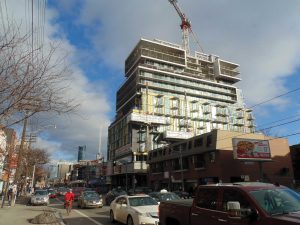Recommendations for mandating community participation

PHOTO CREDIT BY BRIAN BURCHELL/GLEANER NEWS: Planned by the OMB: College Street is rife with developments denied by the city, only to have been approved on appeal by the provincial agency.
By Annemarie Brissenden
Four local residents’ associations, collectively representing the north end of Ward 20, banded together late last month to submit commentary on the province’s review of the Ontario Municipal Board (OMB). In their letter to the Province of Ontario’s planning policy branch, the Annex Residents’ Association (ARA), Harbord Village Residents’ Association, Huron-Sussex Residents’ Organization, and the Seaton Village Residents’ Association determined that neither the City of Toronto nor the OMB have enough resources to manage the overwhelming influx of planning and development applications that are processed on a regular basis. As such, their recommendations are aimed at reducing the number of appeals heard by the provincial body.
“You can’t have a city growing at this pace and not have the [planning resources] to deal with it,” said David Harrison, ARA chair. “It’s all very well to make a blanket condemnation of the OMB, but it’s put in this position because the city doesn’t have the resources to handle [the number of applications].”
“Mediation prevents a win/lose battle”—Paul MacLean, PARA
The recommendations can be grouped into four categories: strengthening the city’s planning resources and clarifying its jurisdiction on development matters; mandating community participation in the planning process; reforming the OMB itself; and providing a mechanism for appealing OMB decisions.
The residents’ associations highlight the importance of adopting the new Official Plan for Toronto, as well as clarifying which matters are the purview of the Committee of Adjustment, whose decisions will soon be appealed to the newly established Local Appeal Board (LAB). Stressing that LAB decisions should not be subject to appeal at the OMB, they propose increasing the processing timeframe for applications to amend the Official Plan and/or zoning bylaws along with staffing levels in the city’s planning department.
The recommendations include providing the following avenues for engaging the community in the planning process: encouraging all rezoning applications to be subject to community review, making mediation a mandatory first step in the OMB appeals process, and making an appellant pay for the costs associated with granting community organizations status at OMB appeals.
“On balance, mediation was a good experience,” explained Paul MacLean of the Palmerston Area Residents’ Association, whose organization was not a signatory to the letter but is no stranger to development. “Mediation prevents a win/lose battle. Having mediated settlements be more the norm seems to make sense.”
Indeed, hiring professional mediators is another recommendation, along with making the proceedings more transparent, promoting multi-member panel reviews, and opening up the appeals process to other provincial ministries and agencies that may be able to provide expert opinions. The residents’ associations also want to reinstate the mechanism for appealing OMB decisions to a parliament committee that includes the riding’s Member of Provincial Parliament (MPP).
“This review looks at how to give more weight to local communities as well as municipal councils to ensure the local voice is heard when it comes to planning,” said Han Dong (MPP, Trinity-Spadina). “It’s time for a comprehensive review. The process needs to be updated.”
Begun in October, the provincial review of the OMB is aimed at making the land-use planning system more efficient. It held a series of town hall meetings in November and December, canvassing comments on proposed changes that included moving away from “de novo” hearings in which the OMB considers matters as though no previous municipal decision has been made; expanding the authority of local appeal bodies; restricting the appeal of decisions that support provincially-funded transit; and limiting appeals on decisions that are based on extensive study.
“We need to have some sort of appeal mechanism,” said Bill Mauro, the Minister of Municipal Affairs. “We’re not doing anything here that is different, but we are addressing concerns.”
Mauro would not commit to a timeline for when any possible amendments will be announced.
“The current government has been reviewing the OMB since 2003,” laughed Joe Cressy (Ward 20, Trinity-Spadina). “If the province was serious about protecting good planning, smart intensification, and building neighbourhoods rather than just adding density, they should free Toronto from the OMB immediately.”
He’s among the councillors supporting Cheri DiNovo (MPP, Parkdale-High Park), who last November tabled a private member’s bill to Free Toronto from the OMB.
“You don’t need to consult; this is something the government has been hearing for ages,” said DiNovo. “It makes no sense that the entire superstructure [municipal process] can be brushed aside by 25 unelected members.”
Cressy believes there “may be a role for the OMB in other parts of the province, but for a city as large and sophisticated as ours, there is no reason to have this body”.
He’s skeptical that anything substantial will come of the review, noting “the province will come up with an excuse a day for why they refuse to act.
“We’re more than capable of planning a great city. The OMB is not.”
READ MORE:
YEAR IN REVIEW: A focus on livability, grindertude (December 2016)
NEWS: Tall tower before OMB, as city battles back with block study (August 2016)
DEVELOPINGS: Annual review reflects tension between community activism and OMB (March 2016)
NEWS: “Vertical rooming house” rejected (May 2015)
